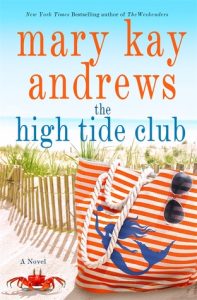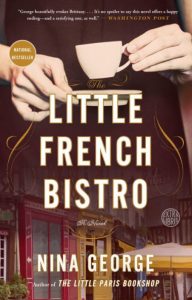 Brooke Trapnell, the runaway bride in Save the Date, continues her story, having moved back to little town, Georgia, with her son, Henry. The resident wealthy socialite philanthropist of nearby Sea Island, Josephine Bettendorf Warrick, contacts Brooke to represent her against the state of Georgia, who wants her land for a state park. The secrets of nonagenarian Josephine slowly seep out as she lays out her plans to atone for her sins and defend her estate by passing it on to descendants of her long ago best friends. Brooke discovers a related family secret she would have never thought to guess.
Brooke Trapnell, the runaway bride in Save the Date, continues her story, having moved back to little town, Georgia, with her son, Henry. The resident wealthy socialite philanthropist of nearby Sea Island, Josephine Bettendorf Warrick, contacts Brooke to represent her against the state of Georgia, who wants her land for a state park. The secrets of nonagenarian Josephine slowly seep out as she lays out her plans to atone for her sins and defend her estate by passing it on to descendants of her long ago best friends. Brooke discovers a related family secret she would have never thought to guess.
Andrews’ description of friendships in the 50s deep South feels less like crossing a color line and more like pushing into an invisible, flexible barrier that they can’t quite break through. The re-emergence of The High Tide Club through the descendants of the original members is meant to be poignant, yet it’s hard to imagine the remaining original member at 95 walking naked into the ocean in chilly October. Though Andrews’ writing continues to be fully engaging, this novel seemed to go long, and it felt as though the author decided at one point to simply wrap up all the loose ends, with revelations coming fast and furious after the typical length of a novel, around 300 pages. There’s a contemporary would-be killer paralleling the murder mystery from decades past, and neither seems credible, nor true to character, even given the circumstances. Despite this, it’s an interesting story and worth it for a sandy good beach read.
I was fortunate to receive a pre-release copy from the publisher of one of my favorite authors.

 Finding Femininity and Feminism in France
Finding Femininity and Feminism in France This story opens in an interrogation room, with Angela prepared to tell her story to police, if they will only listen. Finally, Detective Novak allows her to share everything that she feels is relevant, beginning with her meeting H.P. in high school, where he changed her life. They became best friends who fell in love, or as Angela tells the story, soul mates. She leads Detective Novak through their complicated relationship, hampered by her lack of a healthy role model and his small town contentment, and further strained by Angela attending Oxford, where she’s befriended by Freddy, who dotes on her against her will. Detective Novak perks up at the entrance of Saskia, the missing wife, the reason for Angela’s interrogation, during H.P.’s visit to England. Misunderstandings ensue, emotions tangle, and new pathways are formed. Angela blames losing her first love on everyone else, spending her life from that point on waiting for him to do the right thing. When her mother moves in uninvited after leaving her father, she pursues an unhealthy friendship with H.P. as their houseguest and babysitter, which culminates in Saskia’s disappearance. Detective Novak pieces together the evidence through the long night of storytelling by Angela, who is either also an innocent victim or a truly unreliable narrator.
This story opens in an interrogation room, with Angela prepared to tell her story to police, if they will only listen. Finally, Detective Novak allows her to share everything that she feels is relevant, beginning with her meeting H.P. in high school, where he changed her life. They became best friends who fell in love, or as Angela tells the story, soul mates. She leads Detective Novak through their complicated relationship, hampered by her lack of a healthy role model and his small town contentment, and further strained by Angela attending Oxford, where she’s befriended by Freddy, who dotes on her against her will. Detective Novak perks up at the entrance of Saskia, the missing wife, the reason for Angela’s interrogation, during H.P.’s visit to England. Misunderstandings ensue, emotions tangle, and new pathways are formed. Angela blames losing her first love on everyone else, spending her life from that point on waiting for him to do the right thing. When her mother moves in uninvited after leaving her father, she pursues an unhealthy friendship with H.P. as their houseguest and babysitter, which culminates in Saskia’s disappearance. Detective Novak pieces together the evidence through the long night of storytelling by Angela, who is either also an innocent victim or a truly unreliable narrator. Dr. Noah Alderman is on trial for his life, accused of murdering his stepdaughter. Her father fought ruthlessly for custody of baby Anna as a power play after Maggie suffered the relatively unknown, but common, postpartum psychosis. With his recent death, Anna reaches out to the mother she wants to know. She enters the family, which includes Noah’s 10-year-old son Caleb, with a fortune from her father and an attitude of entitlement. Her accusations of molestation against Noah rend Maggie’s heart. Though circumstantial evidence points to Noah as Anna’s killer, Maggie retains a sliver of hope, not quite able to believe he is capable of such an atrocity. A phone call with shocking news sets Maggie on an investigation that may possibly free Noah and return him to her.
Dr. Noah Alderman is on trial for his life, accused of murdering his stepdaughter. Her father fought ruthlessly for custody of baby Anna as a power play after Maggie suffered the relatively unknown, but common, postpartum psychosis. With his recent death, Anna reaches out to the mother she wants to know. She enters the family, which includes Noah’s 10-year-old son Caleb, with a fortune from her father and an attitude of entitlement. Her accusations of molestation against Noah rend Maggie’s heart. Though circumstantial evidence points to Noah as Anna’s killer, Maggie retains a sliver of hope, not quite able to believe he is capable of such an atrocity. A phone call with shocking news sets Maggie on an investigation that may possibly free Noah and return him to her.